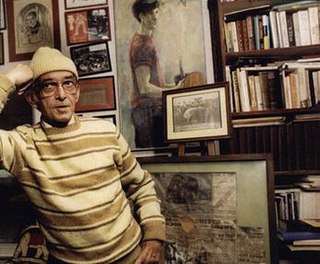A Quote by Wyndham Lewis
When we say 'science' we can either mean any manipulation of the inventive and organizing power of the human intellect: or we can mean such an extremely different thing as the religion of science, the vulgarized derivative from this pure activity manipulated by a sort of priestcraft into a great religious and political weapon.
Related Quotes
However the great successes of science - Galileo's telescopic observations, Newton's law of gravity, etc - all of this great success caused people to sort of say, what if we could establish religion on that same successful basis? What if we could have a good rational foundation for religious belief. What if religion could be sort of like science. Of course, that can't be.
This [the opening of the Vatican City radio station built by Marconi earlier in 1931] was a new demonstration of the harmony between science and religion that each fresh conquest of science ever more luminously confirms, so that one may say that those who speak of the incompatibility of science and religion either make science say that which it never said or make religion say that which it never taught.
Trouble arises when either science or religion claims universal jurisdiction, when either religious dogma or scientific dogma claims to be infallible. Religious creationists and scientific materialists are equally dogmatic and insensitive. By their arrogance they bring both science and religion into disrepute.
Being holy . . . does not mean being perfect but being whole; it does not mean being exceptionally religious or being religious at all; it means being liberated from religiosity and religious pietism of any sort; it does not mean being morally better, it meas being exemplary; it does not mean being godly, but rather being truly human.
This much I can say with definiteness - namely, that there is no scientific basis for the denial of religion - nor is there in my judgment any excuse for a conflict between science and religion, for their fields are entirely different. Men who know very little of science and men who know very little of religion do indeed get to quarreling, and the onlookers imagine that there is a conflict between science and religion, whereas the conflict is only between two different species of ignorance.
Power is not something we should be afraid of. Power is great, power is energy. And in terms of energy, the most important energy is human spiritual energy and when I say spiritual, I feel like have to be very careful, I don't mean religious, I mean the energy of the mind, the energy that exists within us.
This example illustrates the differences in the effects which may be produced by research in pure or applied science. A research on the lines of applied science would doubtless have led to improvement and development of the older methods - the research in pure science has given us an entirely new and much more powerful method. In fact, research in applied science leads to reforms, research in pure science leads to revolutions, and revolutions, whether political or industrial, are exceedingly profitable things if you are on the winning side.
Spiritual fulfillment doesn't have to mean belief in a religion or disbelief in science. ... Whether one believes in an unseen, all-knowing force, or the wonder of science and the universe, or simply the beauty of the human spirit, nearly every one of feels an inner longing to feel part of something bigger than ourselves.



































